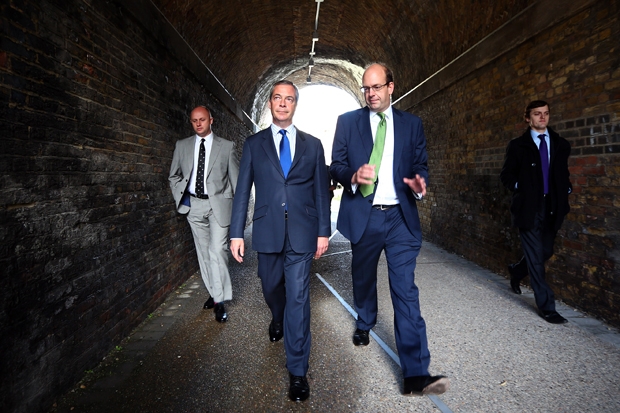It is interesting that neither Scotland nor Wales have been much bitten by the Ukip bug. The supposedly sensible view is that both of these countries are more kindly disposed towards the European Union than are the English — and that Ukip’s contempt for the European Parliament and its politicians is seen as another example of that rather too familiar English jingoism and xenophobia, commodities which are not terribly popular either north of Berwick or west of Monmouth. It is also sometimes mentioned that immigration is far less of an issue in Wales and Scotland — unless we are talking about English immigration, which does indeed tend to make the Jocks and the Taffs reach for their tins of paraffin from time to time. Well, sure. There’s probably a modicum of truth in both of these arguments — but it’s the deciding factor only if you see Ukip’s rise primarily as a consequence of its opposition to the EU and its tough line on immigration. I do not, entirely.
I think the question of EU membership scarcely impinges upon most of the voters who — in Clacton and Heywood and (as we shall see) Rochester — decided to clamber aboard Nigel Farage’s somewhat ramshackle and undoubtedly gas-guzzling bandwagon. Indeed, a recent opinion poll suggested that the public was slightly more favourably inclined towards the EU at the moment than it has been for several years. Christ alone knows why this should be. But there we are.
Immigration is undoubtedly a critical issue, and especially so among former Labour party voters; blue-collar workers of a certain age. But I suspect that the real pull of Ukip in England is that the party, and Mr Farage particularly, are seen as a corrective to the vapid, flaccid, spineless, politically correct and wholly London-centric mitherings of what, until May next year, we must call the main three parties. That is also why Ukip does not do terribly well in London itself — despite its leader’s long immersion in the Square Mile, making sacks of wonga, Ukip has become the anti-London party. Its views on such stuff as immigration, wind farms and to an extent smoking, gay marriage, Islam and so on, are not so much ‘right-wing’ as simply ‘not London’. I have long held that the split between the capital and the rest of the nation has widened to the extent that we are now effectively two separate countries: an insulated, affluent and achingly liberal city-state on the one hand, and on the other, the rest of England — from Truro to Carlisle, but especially north of the Wash. It is the London establishment, and its fatuous and self-serving shibboleths, which is loathed throughout the rest of the country, in a way which has not quite been seen before, even if there was always a certain divide. The London of Cameron, Miliband and Clegg, and the BBC and Channel 4 and the quangos and extremely well-fed and gobby third sector institutions, and the lawyers and the bankers; the establishment. Oh, and its money and its comfort — a much-trumpeted economic recovery which has simply not been experienced anywhere else. London is not much liked, and still less admired, beyond its smug satellites and dormitories (which admittedly now stretch into the south Midlands). And Ukip has tapped into this reservoir of discontent with great success.
Which brings me back to Scotland and Wales. My guess is that the campaign for independence in Scotland drew momentum from precisely this feeling. Not an anti-Englishness per se, but an anti-London and anti-Westminster frame of mind. My suspicion is that the Scots felt a great distance from London, an exponentially greater distance than they felt separated them from, say, Newcastle, Manchester or Birmingham. And they have a convenient conduit for this disaffection in both the Scottish Parliament and the Scottish National Party. The same is true, to an only slightly lesser extent, in Wales: National Assembly and Plaid Cymru. Ukip performs badly in Scotland and Wales because the potent anti-London sentiment is robustly promulgated by the nationalist parties. There is, then, no great need for Ukip in Scotland and Wales.
But increasingly, there is no need for Labour, either. Labour is perhaps more a party of London, these days, than either the Liberal Democrats or the Conservatives. It is led, ineptly, by someone who is almost the personification of effete, metropolitan-liberal milquetoast opinion (and yet who represents Doncaster, because Doncaster’s a safe seat, for a while). The party has become upper-middle-class and southern — all the while still raking in the votes from its old redoubts in the post-industrial north of the country. I wonder how long it will be able to do so. There is already evidence that Ukip is gnawing away at the voters who have been Labour all their lives but have now had enough. And look at the latest opinion poll from Scotland. Ipsos-Mori suggested that if an election were held now, Labour would lose all but four of its 40 seats in Scotland, including the seat currently occupied by Douglas Alexander. Hell, you’d need a heart of stone not to laugh, wouldn’t you?
One suspects that this disaffection with Labour will, sooner or later, spread south of the border. The Scots are ditching Labour for the SNP because the SNP has tenure; it can win elections, it can rule. And while politically they may have little in common, the same tranche of thoroughly hacked off blue-collar workers south of the border might soon consider that Ukip has the same sort of potential. And then where will Labour be?







Comments